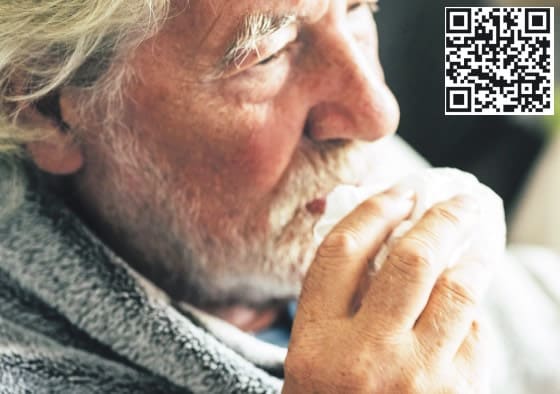Tips from the expert team at Quirónsalud Costa Adeje
Older adults with dementia or who have had severe cardiovascular disease may experience atypical symptoms such as impaired consciousness or muscle weakness with falls or refusal to eat. The professionals at Quirónsalud Costa Adeje recommend exercising daily, avoiding crowds, adhering to age-appropriate dietary guidelines, and receiving recommended vaccinations to prevent or relieve symptoms of respiratory infections in older people. Respiratory infections can be caused by viruses, bacteria, or other microorganisms. Viruses such as rhinovirus, adenovirus, coronavirus, influenza (influenza) virus, and respiratory syncytial virus (VRS) are the most common cause of respiratory infections.
Transmission of these viruses occurs primarily through respiratory droplets when coughing or sneezing and can also occur through direct contact with contaminated surfaces. On the other hand, bacteria are the cause of infections such as pneumonia and bronchitis, which, unlike viruses, require treatment with antibiotics, as the specialists at Quirónsalud Costa Adeje explain. Common symptoms of a respiratory infection include nasal congestion, sore throat, sneezing, fever, cough, fatigue, difficulty breathing, and headache. These symptoms can vary in severity and duration. In more serious infections such as pneumonia or COVID-19, symptoms such as shortness of breath, persistent chest pressure, confusion, and bluish lips or facial skin may occur, requiring immediate specialized care or emergency medical care, pulmonologists warn.
Older adults may have symptoms similar to those of respiratory infections as young adults, including sore throat, feeling distant, weakness, coughing, sneezing, etc., or more severe symptoms such as chest pain, shortness of breath, purulent sputum, or fever. However, particularly frail older people, such as those with dementia or severe cardiovascular disease, may present with atypical symptoms such as impaired consciousness, muscle weakness with falls, or refusal to eat. Beyond the respiratory system, older adults may notice a significant loss in muscle strength. Prevention should start at the onset of infection with adequate nutrition and maintaining a high level of activity, even when hospitalized, because this reduces the risk of subsequent infections, usually more serious, as the experts at Quirónsalud Costa Adeje emphasize.

“Alcohol buff. Troublemaker. Introvert. Student. Social media lover. Web ninja. Bacon fan. Reader.”







More Stories
Zoonoses: Do squirrels transmit leprosy?
How is it treated and how can it be prevented?
Research has found that the T. Rex dinosaur was as intelligent as a giant crocodile